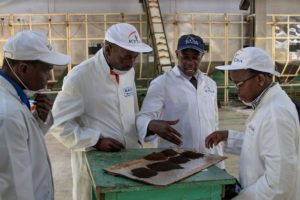
Image: Rainforest Alliance
The COVID-19 pandemic is affecting many Kenyan communities, which depend on the tea sector, as the tea sector’s output and demand in tea is falling. However, an innovative Kenyan project running three years is continuing to create thousands of healthier homes, supporting small and medium-sized enterprises, while reducing the demand for firewood which helps reduce deforestation.
In terms of public health, Kenya counts 21,650 premature deaths yearly caused by exposure to smoke from polluting, open fires, or inefficient fuels. Smoke from firewood and charcoal causes 16,600 deaths in Kenya each year.
The Rainforest Alliance sought to address this issue by setting up a project to develop inexpensive, safe, accessible renewable energy sources to conserve native forests and ensure healthier smoke-free homes.
The solution was the local manufacture of carbonised briquettes made from farm waste materials (e.g. sawdust and corn husks, sugarcane bagasse, macadamia shells and coffee husks) supplied to homes and tea processors. The project has already enabled thousands of Kenyan households to switch to cleaner, safer and more affordable cooking.
A recent report from Global Forest Watch confirms that an area the size of football pitch of tropical rainforest is lost every six seconds based on 2019 satellite data. Kakamega Forest in Kenya is its only tropical rainforest and is said to be the last remnant of the ancient Guineo-Congolian rainforest that once spanned the continent. For decades, the forest has been shrinking due primarily to poverty-driven logging, harvesting of medicinal resources, and agricultural expansion.
The tea industry, Kenya’s biggest employer, is a heavy consumer of firewood - estimated at 29,000 m3 per year. However, Kenya currently only has enough wood to meet only 70 per cent of this demand through sustainable domestic supply. This shortage is putting terrible pressure on Kenya’s forests and has led to a national deforestation crisis which has also contributed to massive water shortages across the country. In fact, this situation has also been happening in many other countries globally where this sort of solution could be introduced.
The Rainforest Alliance’s recognised the issues facing Kenya a number of years ago and established a ground presence in Kenya’s tea sector. One of the aims of this project has also been to reduce the use of firewood in tea factories. As a result it was uniquely positioned to help realise a shift from firewood to smoke-free briquettes made from farm waste such as sawdust and corn husks, sugarcane bagasse, macadamia shells and coffee husks.
By partnering with Kenya Tea Development Association (KTDA), the project has established tree nurseries in 12 factories aiming to have over 1,000,000 trees within a year. 12 tree nurseries with at least 150,000 seedlings each. The project targets to grow over 1,000,000 trees in the tea landscape over a period of 1 year. Since the program started over 13,000 households who have switched to briquettes, solar energy and use of efficient cook stoves.
This Kenyan Renewable Energy Project could be replicated in other tea growing landscapes globally to provide the essential infrastructure that supports life on Earth and human development. The project hopes it can continue to catalyse a renewable energy transformation in Kenyan tea-producing regions to stop deforestation, create sustainable, long-term employment for energy entrepreneurs, and improve health outcomes as well as jobs in tea farming communities.
In the tea landscapes of Kenya, the Rainforest Alliance partners with local renewable energy entrepreneurs working to stop deforestation, fight climate change, and improve public health by promoting more sustainable alternatives to firewood.
These everyday climate heroes run Household Energy Centers (HECs) that make and sell a range of renewable-energy products. With access cut off to these HECs, the Kenya team is worried that they will now see a spike in deforestation.
“Unable to buy biomass briquettes, farmers will revert to using firewood from nearby forests and on-farm trees” explains Kiprono.
Their team is now negotiating with the Kenyan Government to have renewable energy products listed officially as an essential commodity, which would allow our local partners to continue their vital work.
Read more:
- 22 June is World Rainforest Day



Leave a Reply or Follow